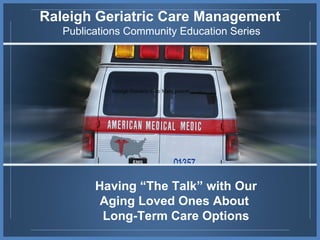
Having The Talk
- 1. Raleigh Geriatric Care Management Publications Community Education Series Having “The Talk” with Our Aging Loved Ones About Long-Term Care Options
- 2. Having “The Talk”- Longevity Today, people are living longer than ever before. And with advanced age often comes the need for care. Meanwhile, the traditional caregivers, the middle-aged adults in the family – by today’s standards that means 40-, 50-, even 60-somethings (i.e., us!) – have demanding careers and busy lives of their own. As a result, many mid-lifers today are faced with balancing these things with not only active involvement in their grandchildren’s or adult children’s lives but also an increasing responsibility for the well-being of an elder loved one.
- 3. Nearly 80 percent of these “sandwiched” caregivers are women. And, on average, they can expect to spend 18 years of their lives helping an aging parent, often while caring for a younger family member, too. Adults age 85 and older are the fastest growing segment of our population, and 58 percent of the over-85 population is disabled in some way. This is a daunting challenge for today’s caregivers. Having “The Talk”- Sandwich Generation
- 4. Having “The Talk” Growing older does not automatically bring incapacity, but when it does, physical and cognitive changes can come on quite suddenly. Thus, it is critical to recognize that it is never too soon to talk with your elderly parents or relatives about the future. It is just another form of family planning.
- 5. Having “The Talk”- Topics Topics can include: • the parent’s lifestyle interests • concerns and directives for medical care • financial-management issues • long-term care insurance • housing choices • options for care
- 11. Having “The Talk”- How To…. Instead of directly asking, “So, do you have long-term care insurance?” or “We’ve noticed you are having trouble taking care of yourself,” begin the discussion in the context of a relative or friend’s experience.
- 12. Having “The Talk”- How To… For example, “This is what happened to Aunt Mary. We want to be better prepared.” Or put the discussion in the context of your own life, such as, “I’m starting to plan for the time when I might have trouble taking care of myself. This is where my documents are. I’ve signed a health-care proxy. Have you made any of these plans yourself?”
- 13. Having “The Talk”- Own The Problem It helps if you “own” the problem. Avoid saying, “You know, Mom, since you had the stroke, you really can’t take care of yourself anymore; you need help.” Instead, try saying, “Since you had the stroke, I can’t sleep or concentrate at work. I’m so worried about you being on your own and being able to take care of things. Would you help me by coming to talk with someone who can help?” Most elders are not going to be resistant if it is expressed in the context of putting their adult children at ease.
- 14. Having “The Talk”- Know the Basics While many adult children don’t end up playing an active role in their elder relative’s planning process, eldercare experts point out the importance of knowing who to go to when the time comes – the attorney, the health-care surrogate, and so on. Listen to the responses you get, and let your parents know you care about them and want to be able to follow through with their wishes.
- 15. Having “The Talk”- Warning Signs • Any major behavioral or functional changes. • An accumulation of diagnoses (more than two). • Falls or repeated hospitalizations. • Short-term memory problems. • Periods of confusion or disorientation. • Calls from your parent’s friends/neighbors expressing concern. • More frequent requests for help or support. • Weight loss over the past year.
- 16. Having “The Talk”- Warning Signs If you live far from your parents, you may need to make frequent visits to assess their situation and reach out to their friends, neighbors and clergy for accurate information between your visits.